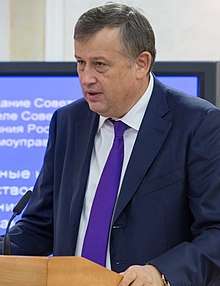Aleksandr Drozdenko
Aleksander Yurievich Drozdenko (born November 1, 1964, village of Akzhar, Bayzak District, Jambyl Region, Kazakh Soviet Socialist Republic, USSR[2]) – Russian economist and politician. Governor of Leningrad Oblast[3] (since May 28, 2012).
Aleksander Drozdenko | |
|---|---|
Александр Дрозденко | |
 | |
| 4th Governor of Leningrad Oblast | |
| Assumed office 28 May 2012 | |
| Preceded by | Valery Serdyukov |
| Vice-Governor of the Leningrad Region & Chairman of the Leningrad Regional Committee for State Property Management | |
| In office 6 November 2002 – 28 May 2012 | |
| Mayor of Kingisepp | |
| In office 1996–2002 | |
| Personal details | |
| Born | Aleksandr Yurievich Drozdenko 1 November 1964 Akzhar, Kazakhstan, Soviet Union |
| Political party | United Russia[1] |
He graduated from the Leningrad Agricultural Institute with a degree in Economics and Organization of Agriculture in 1986 and obtained a PhD in Economics in 2007.[4]
From 1988 to 2002, he worked in various positions in Kingiseppsky District of Leningrad Region, and was Chairman of the Kingisepp City Council of People's Deputies and Mayor of Kingisepp District.
On November 6, 2002, he was appointed as Vice Governor of Leningrad Region – Chairman of Leningrad Region Committee on State Property Management. At the same time, he was a Head of the Leningrad Regional office of the Ministry of Property Relations of Russia.
On May 5, 2012, President of Russian Federation introduced Alexander Drozdenko for consideration by the Legislative Assembly of Leningrad Region as a nominee for the position of Governor of Leningrad Region.[5] On May 12, 2012, Mr. Drozdenko’s appointment as Governor of Leningrad Region was confirmed. He was inaugurated on May 28, 2012.
At the early election on September 13, 2015, Alexander Drozdenko received the support of 471,145 voters, which amounted to 82.1% of the voting public that took part in the election.[6]
As Governor of Leningrad Region, he initiated a long-term “Region of Successful People” Strategy of regional development. He pursues a coherent policy of reducing debt load on the regional budget (the region hasn’t had any debts to commercial structures since 2017), introducing project management and attracting investors. Since 2014, Leningrad Region has been consistently included in the TOP 10 constituent entities of Russian Federation by volume of investment growth in fixed capital. In 2017, the gross regional product of Leningrad Region exceeded 1 trillion rubles for the first time in contemporary history.[7] Based on the results for 2017, Leningrad Region took 12th place in the National Rating for Investment Attractiveness[8] established by the Agency for Strategic Initiatives.
Governor Drozdenko also initiated a large-scale restoration program in Vyborg involving international and federal funding.[9] He reformed the social security system, basing it on criteria of need and unified social standards. By the order of the Governor, a program for the renovation of educational establishments was implemented in Leningrad Region in 2015. In three years (2015–2017), 28 schools and 4 vocational schools were renovated from regional public funds.
He supported the initiative group to shut down the Krasny Bor hazardous waste landfill site operated by St. Petersburg within the region’s territory.[10]
In 2015 he brought the allocation of municipal land plots for house construction in areas bordering St. Petersburg under regional control. For compensatory accelerated development of infrastructure in new-build areas, the “Public Amenities in Exchange for Taxes” program has been implemented.[11]
The Governor pursues a policy of transparency – he meets residents in districts of the region and answers calls on a live phone-in show twice a month. Upon the initiative of the Governor, sessions of the Government of Leningrad Region are broadcast live online. Since 2017, he has his own blog on Youtube.
The Governor of Leningrad Region is married and has two daughters. He has several hobbies, such as hunting, fishing, and motorbike touring. He also plays volleyball within a regional government team.
References
- Дрозденко Александр Юрьевич на официальном сайте Единой России
- Дрозденко Александр Юрьевич
- Дрозденко официально вступил в должность губернатора Ленинградской области
- Биография Александра Дрозденко
- Кандидатура Дрозденко внесена на пост губернатора Ленобласти
- Дрозденко победил на выборах губернатора Ленинградской области, набрав 82,1% голосов
- ВРП Ленобласти достиг исторического максимума в 1 трлн рублей Об этом сообщает Рамблер. Далее: https://finance.rambler.ru/business/39531157/
- Дрозденко объяснил рывок Ленобласти в рейтинге АСИ
- На реконструкцию Выборга в Ленинградской области направят 1,8 млрд рублей
- Под Петербургом на полигоне "Красный бор" полностью отказались от сжигания опасных отходов
- Ленобласть продолжит программу с застройщиками "Соцобъекты в обмен на налоги"